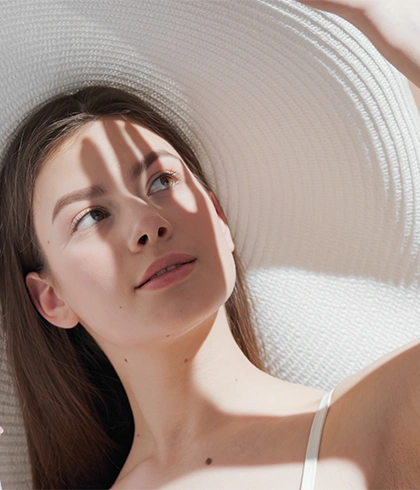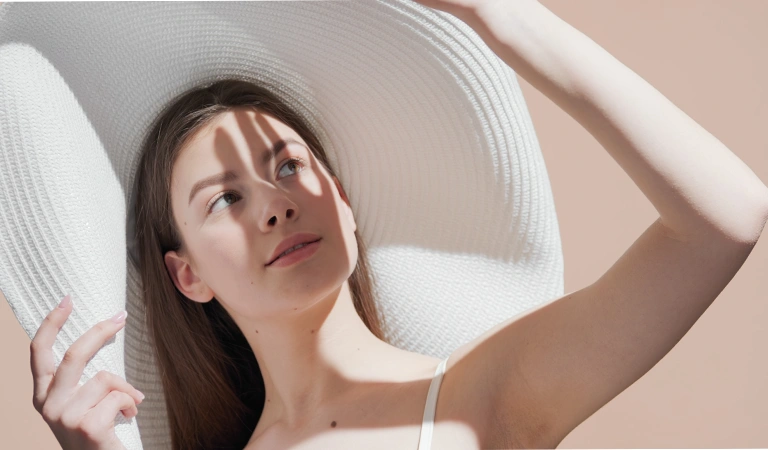

Sun Protection Tips for UAE Residents with Actinic Keratosis by Dr Batra’s®
Actinic keratosis (AK) is a common skin condition, especially prevalent among people who live in sunny regions like the UAE. This condition mainly develops due to prolonged exposure to the sun’s UV rays. You might be suffering from it if you see rough patches and scaly spots on your skin. In a high-UV region like the UAE, people with AK face greater challenges in managing their skin’s health due to intense sunlight throughout the year. Sun protection is therefore essential for UAE residents with AK to prevent the progression of actinic keratosis symptoms and maintain skin health.
If you are facing a persistent issue with any of the symptoms of AK, we recommend you try Dr Batra’s homeopathic skin treatment in UAE. Our expert medical team will be able to properly assess your skin condition and develop a customized treatment plan for you. We’ve been treating various skin conditions naturally for over 40 years globally!
Let’s explore AK in more detail and discuss effective sun protection tips for those living under the UAE’s harsh sun.
What is Actinic Keratosis?
Actinic keratosis is a pre-cancerous skin condition caused by chronic sun exposure, making the skin more vulnerable to sun damage. It’s a common issue in regions with intense sunlight, as excessive UV exposure can damage the skin’s outer layers over time. This condition usually presents as rough or dry brown spots on the skin or as scaly spots that feel uneven to the touch. Actinic keratosis can be an early warning sign, as without proper care, it may lead to skin cancer.
Common Symptoms and Appearance
Actinic keratosis typically appears as rough patches, sometimes resembling a rough patch on the skin with a gritty texture. These patches may vary in colour, appearing as red, brown, or even pinkish areas that stand out from the rest of the skin. Common sites include areas frequently exposed to the sun, such as:
- Face
- Scalp (for those with thinning hair)
- Ears
- Neck
- Arms and hands
These spots may be sensitive and feel itchy, and they don’t fade on their own, so they need to be monitored closely.
Why Are UAE Residents at Risk?
For residents of the UAE, sun exposure is almost unavoidable. With year-round high temperatures and intense sunlight, skin is continuously exposed to UV rays, increasing the risk of actinic keratosis. Unlike regions where sunlight varies with seasons, the UAE’s hot climate requires extra care all year round.
Effective Sun Protection Strategies
Let’s look at some steps you can take to protect yourself from overexposure to the Sun. The steps are reasonably simple, but you need to be proactive and intentional about following them so that you can reduce the risk of further sun damage and prevent AK from worsening.
1. Make it a Habit to Use Sun Protection Daily
Regular sunscreen use is essential for people with actinic keratosis. Select a broad-spectrum sunscreen with SPF 50 or higher to ensure effective protection against UVA and UVB rays. Reapply every two hours, especially if you are outdoors for long periods. Carrying a sunscreen spray for touch-ups can also help you stay protected throughout the day.
2. Wear Protective Clothing and Accessories
Simple adjustments in clothing can go a long way in protecting your skin from harmful UV rays:
- Wear Long Sleeves and Full Pants: Opt for lightweight, long-sleeved clothes and trousers to cover most of your skin, especially during peak Sun hours.
- Wide-brimmed Hats: These can shield your face, neck, and ears from direct sunlight.
- UV-blocking Sunglasses: Protecting your eyes is equally vital, as UV rays can affect the delicate skin around the eyes. Look for large frames that cover a fairly large area around your eyes.
3. Time Your Outdoor Activities
Limiting direct sun exposure from 10 AM to 4 PM is advisable, as this is when the Sun’s rays are most intense. If you must be outdoors during these hours, make sure to follow the other steps mentioned above, and try to stay in shaded areas as much as possible.
4. Keep Yourself Hydrated
The UAE’s dry and hot climate can dehydrate your skin, especially if you have AK. Hydrated skin acts as a barrier, protecting against harmful UV rays. Dehydrated skin, on the other hand, is more susceptible to damage. Adequate hydration also helps maintain skin elasticity and prevent premature aging, further reducing the risk of rough patches on the skin.
Special Considerations for UAE Residents
With its extreme temperatures and dry climate, the UAE presents unique challenges for individuals with actinic keratosis. To care for your skin effectively, keep the following points in mind:
- Moisturize Daily: Moisturizing your skin daily helps reduce dryness and flaking, common among those with AK. Choose non-comedogenic, fragrance-free moisturisers to avoid skin irritation.
- Use Cooling Treatments: After a day out in the sun, applying aloe vera gel or using a cold compress can provide relief to sun-exposed areas. These methods help soothe scaly spots on the skin and reduce redness or irritation.
- Avoid Irritants: People with AK often have sensitive skin, so it’s essential to avoid harsh soaps and skincare products containing alcohol, which can further dry out the skin and irritate rough-patch skin.
Conclusion
Sun protection is crucial for individuals with actinic keratosis, especially for UAE residents exposed to strong sunlight throughout the year. Consistently following sun protection practices, wearing suitable clothing, and keeping the skin well-hydrated can make a big difference in managing actinic keratosis symptoms and preventing further damage. Regular dermatologist visits are also key for monitoring any progression of AK and ensuring timely actinic keratosis treatment if necessary.
If you’re experiencing scaly spots on the skin or other signs of AK, schedule a consultation with Dr Batra’s® to get the right support and advice for maintaining healthy skin. Let our experts help you protect your skin and keep it at its best, even under the UAE’s intense sun.
FAQs
Can Actinic Keratosis disappear on its own?
Actinic keratosis typically does not go away on its own and requires proper management to prevent worsening. In some cases, AK may improve with sun protection measures, but it’s best to consult a dermatologist for appropriate actinic keratosis treatment options.
What is the best sunscreen for someone with Actinic Keratosis in the UAE?
For people with actinic keratosis, a broad-spectrum sunscreen with SPF 50 or higher is recommended. Choose a formula that’s non-comedogenic and free from fragrances to avoid skin irritation. It’s best to use sunscreen specifically designed for sensitive skin.
Is wearing sunscreen enough to protect my skin in the UAE?
While sunscreen is essential, it is not enough by itself, especially in a sunny place like the UAE. You should combine it with other protective measures, such as wearing sun-protective clothing, hats, and sunglasses, and avoid sun exposure during peak hours. Taking these precautions can help prevent the worsening of dry brown spots on the skin due to actinic keratosis.
How often should I get screened for Actinic Keratosis?
Regular skin screenings are recommended, especially for those with a history of prolonged sun exposure or a tendency to develop rough patches on the skin. Most dermatologists suggest annual check-ups, but people with multiple AK spots or other risk factors should get checked more frequently.
What is the best homeopathic treatment option for Actinic Keratosis?
Homeopathy may offer supportive remedies for managing actinic keratosis symptoms. Remedies are often individualized, so it’s best to consult with a qualified homeopath at Dr Batra’s® who can suggest the appropriate treatment based on your symptoms and overall health. Commonly used homeopathic remedies for AK include remedies that target skin healing and soothe rough or dry skin areas.




